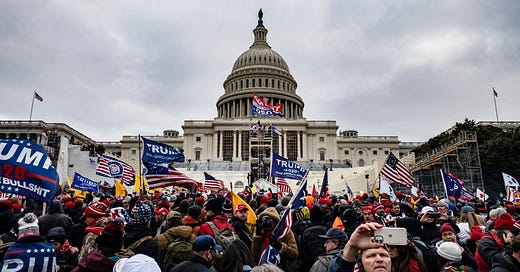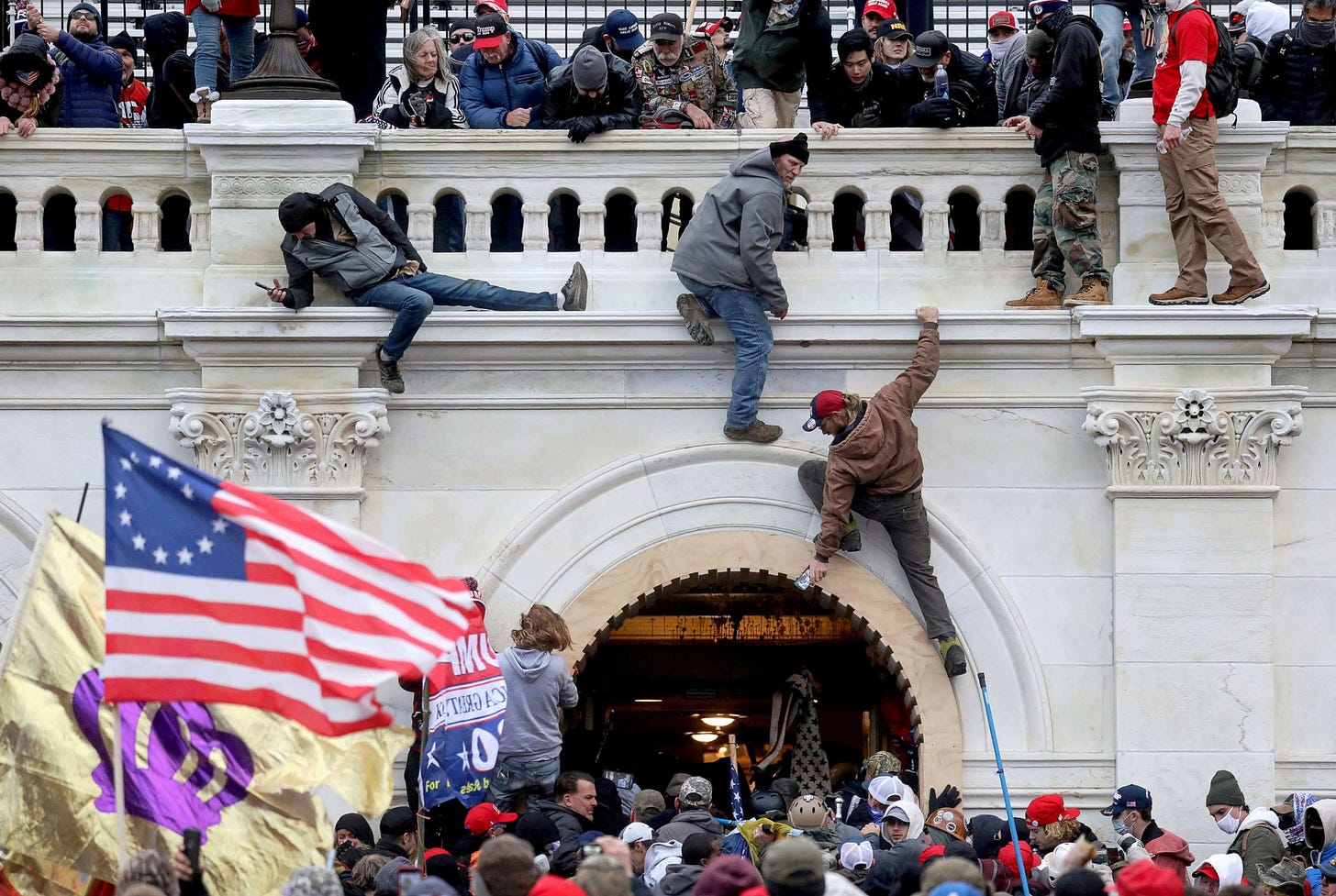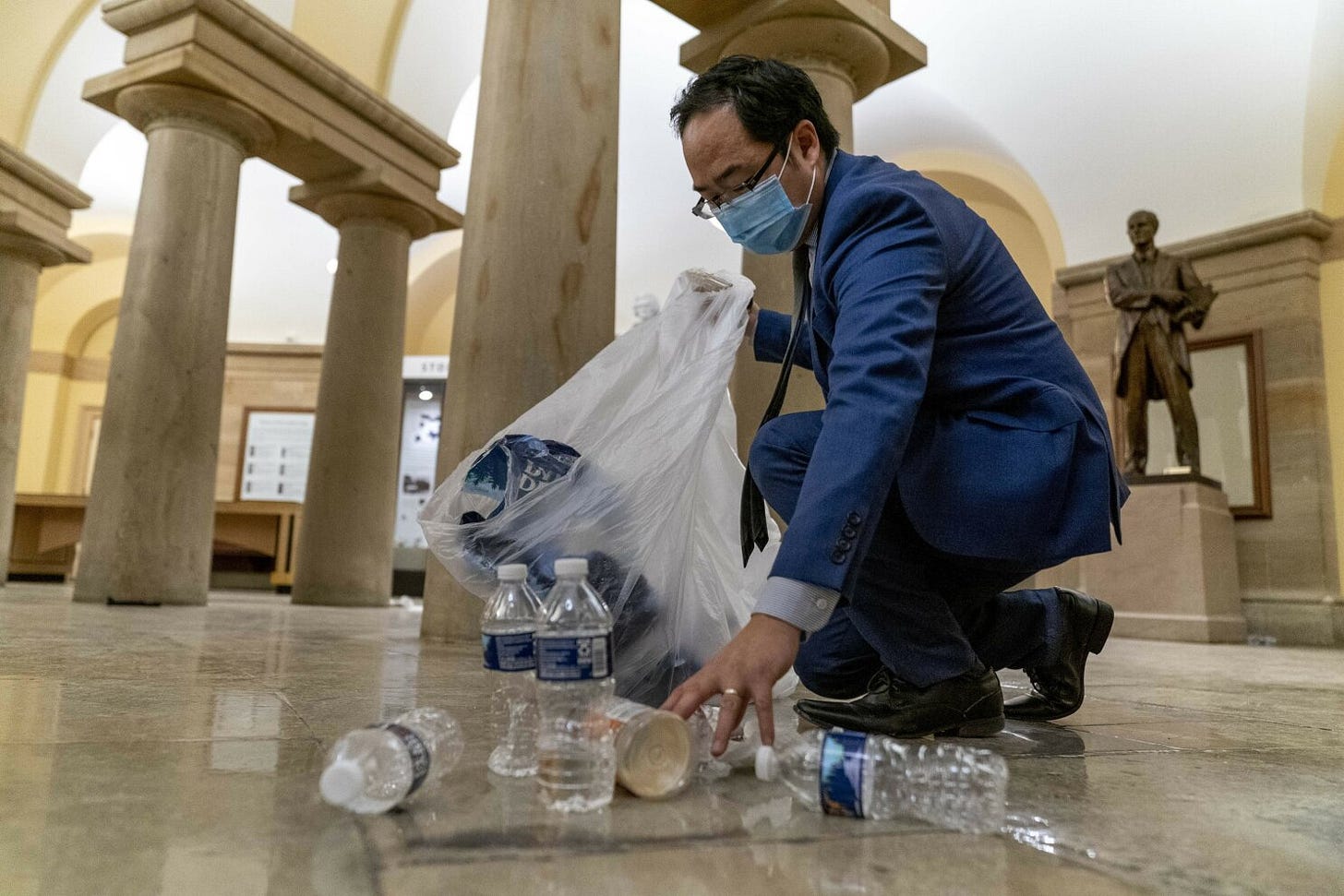January 6 was the Worst Attack on our Democracy in History
Jan 6 was not only attack on Democracy, it was an attack on all public servants
My Fellow Democracy Defenders,
January 6 is a day that will live in infamy.
As a government worker, I saw January 6 unfold. The day started normally. I took the Metro to pick up equipment that I had left at the office. When I got out of the station, I was shocked by how many MAGAt fascists were walking around the streets. I was shaking when I had to wait in line with them at my favorite coffee shop. None of them were wearing masks and yelled at me for telling them to put one on because it would protect my immunocompromised child.
When I alerted my manager, they said that I could take a mental health day. My partner and I watched in horror as the insurrection unfolded on CNN. Many of my colleagues hid under their desks and barricaded their offices. That is why working from home keeps us safer. I still can’t believe so many Nazis invaded our sacred capital, assaulted democracy, and the Orange Menace behind the whole coup will be sworn in as President again. It was by far the worst attack on our Democracy in American history.
On the bright side, NJ Rep Andy Kim was just elected as the first AAPI Senator from that state. Diversity is our greatest strength! This is what all government workers have to do - clean up after the fascist MAGAts.
REMINDER: I am a government worker writing anonymously because I fear retribution. Your support will give me courage to speak truth to power. If I lose my civil service career because of Trump’s fascism and DOGE, any income from Substack will help me support my partner, our children, and our adorable cats.
Here are all the reasons why January 6 is the worst attack on American democracy ever:
1. Disruption of the Electoral Process
On January 6, Congress was in the process of certifying the results of the 2020 presidential election, a routine but critical step in the peaceful transition of power from one administration to the next. The storming of the Capitol by a violent mob temporarily halted this process, threatening the constitutional order and the legitimacy of the election outcome.
2. Undermining Public Trust in Democratic Institutions
The attack was fueled by widespread disinformation and false claims about the 2020 election being "stolen." The rioters sought to overturn the results of a free and fair election, which undermined public trust in the electoral process and democratic institutions more broadly. Such efforts to delegitimize an election can erode confidence in the system and weaken democracy over time.
3. Incitement by Political Leaders
The insurrection was in part instigated by then-President Donald Trump and some of his allies, who repeatedly made baseless claims of widespread voter fraud and called on supporters to "fight like hell" to stop the certification of the election. Such rhetoric from a sitting president and his supporters attacking the integrity of the election is unprecedented in modern U.S. history and represents a severe threat to democratic norms.
4. Violence Against Lawmakers and Law Enforcement
The rioters breached security, vandalized the Capitol, and posed a direct physical threat to lawmakers, staff, and law enforcement officers. Some rioters were calling for the execution of elected officials, including Vice President Mike Pence and House Speaker Nancy Pelosi. The violence led to multiple deaths, injuries to law enforcement officers, and significant emotional trauma for those involved.
5. Symbolic Attack on the Seat of Government
The U.S. Capitol is not just a building but a powerful symbol of American democracy. It houses the legislative branch of government, and the attack on it was an attack on the heart of the democratic process. The storming of the Capitol by U.S. citizens, many of whom were motivated by a desire to overturn an election, was a stark and shocking moment in American history.
6. Long-Term Implications for Democracy
The events of January 6 have had lasting consequences for American democracy. They have deepened political polarization, led to widespread debates about the integrity of future elections, and raised concerns about the potential for further political violence. The attack also led to increased security measures around the Capitol and a broader reckoning about the state of U.S. democracy.
The January 6 attack is considered one of the worst attacks on American democracy because it was a violent attempt to prevent the peaceful transfer of power, a cornerstone of democratic governance. It involved the use of force to challenge the outcome of a legitimate election, undermined trust in democratic institutions, and was incited by political leaders. The implications of this event continue to resonate in American political life, casting a shadow over the future of democracy in the U.S.







It is a day if infamy and the fact that so many people thought that it was a hoax is a sign of America's worst shame.
Thanks for giving us the opportunity to speak out!